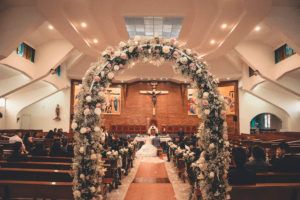St. Paul writes to the church in Ephesians Chapter 5, addressing the relationship between a husband and wife. He goes on to compare the relationship between a husband and a wife – marriage – to the relationship between Christ and his church. Let’s take a deep dive into the entire scripture passage:
“Husbands, love your wives just as Christ loved the church and gave his life for it. He did this to dedicate the church to God by his word, after making it clean by washing it in water, in order to present the church to himself in its beauty – pure and faultless, without spot or wrinkle or any other imperfection. Men ought to love their wives just as they love their own bodies. A man who loves his we loves himself. (None of us ever hate our own bodies. Instead, we feed them, and take care of them, just as Christ does the church; for we are members of his body.) As the scripture says, “For this reason a man will leave his father and mother and unite with his wife, and the two will become one.” There is a deep secret truth revealed in this scripture, which I understand as applying to Christ and the church. But it also applies to you: every husband must love his wife as himself and every wife must respect her husband.” (Ephesians 5:25-33) (Emphasis added)
From the beginning, marriages have been created when both a man and a woman leave their parents and become one new familial unit. This in and of itself is a great mystery. Let’s think about it. Two people not related to each other, leave their family of origin and commit to marry. To commit to each other – physically, emotionally, financially, and legally – in every possible way. To bring children into this world, caring and providing for them. This is a great mystery indeed! Even when no children are born of the marriage, the spouses are still one flesh. The mystery still prevails.
However, St. Paul writes, “There is a deep secret truth revealed in this scripture, which I understand as applying to Christ and the church.” What is St. Paul talking about? He is referring to how Jesus, God the Son, left his Father in heaven to come to earth to rescue his bride, the church. Jesus was the ultimate bridegroom and he died for his spouse on the cross to save her from her sins.

In St. Paul’s reference to this great mystery of Christ’s marriage with his church, Human Marriage was not nullified. Quite the opposite. St. Paul pointed out the greatness contained within it: the sacrament we live out bears witness to our nuptial relationship with Christ.
How do we know Christ is our bridegroom? Because the bible tells us so! Let’s look at three scriptures wherein Jesus is referenced as the bridegroom:
- In John 3:28-30, John the Baptist identifies Jesus as the bridegroom – “You yourselves are my witnesses that I said, ‘I am not the Messiah, but I have been sent ahead of him.’ The bridegroom is the one to whom the bride belongs; but the bridegroom’s friend, who stands by and listens, is glad when he hears the bridegroom’s voice. This is how my own happiness is made complete. He must become more important while I become less important.”
- In Matthew 9:14-15, Jesus is questioned why his followers do not fast – “Then the followers of John the Baptist came to Jesus, asking, “Why is it that we and the Pharisees fast often, but your disciples don’t fast at all?” Jesus answered, “Do you expect the guests at a wedding party to be sad as long as the bridegroom is with them? Of course not! But the day will come when the bridegroom will be taken away from them, and then they will fast.”
- In Matthew 22:1-14, Jesus tells the parable of the wedding feast – “…The kingdom of heaven is like this. Once there was a King who prepared a wedding feast for his son. He sent his servants to tell the invited guests to come to the feast, but they did not want to come. So he sent other servants with the message for the guests: “My feast is ready now; my steers and prize calves have been butchered, and everything is ready. Come to the wedding feast! But the invited guests paid no attention and went about their business…Then he called his servants and said to them, “My wedding feast is ready, but the people I invited did not deserve it. Now go to the main streets and invite to the feast as many people as you find. So the servants went out into the streets and gathered all the people they could find, good and bad alike, and the wedding hall was filled with people….”
How else does Human Marriage mirror Christ’s marriage with his church? It is in the sanctification process that both relationships provide. Husbands are to love their wives “just as Christ loved the church and gave his life for it. He did this to dedicate the church to God by his word, after making it clean by washing it in water, in order to present the church to himself in its beauty – pure and faultless, without spot or wrinkle or any other imperfection.” (Ephesians 25-27).
God is always in the process of working in our lives to mold us more and more into the image and likeness of his son. As members of the body of Christ (the bride), we are always seeking to grow close in our relationship with our bridegroom. This can be by dealing with sin in our lives, trying to bear fruit of the spirit, prayer, and following God’s will for us. It is like the scripture encourages us:
“Keep on working with fear and trembling to complete your salvation, because God is always at work in you to make you willing and able to obey his own purpose.” (Philippians 2:12b-13)
The Catechism of the Catholic Church (CCC) also assists us in understanding this relationship between Human Marriage versus Christ and his church. In §1617 the CCC states:
“The entire Christian life bears the mark of the spousal love of Christ and the Church. Already Baptism, entry into the people of God, is a nuptial mystery; it is so to speak the nuptial bath which precedes the wedding feast, the Eucharist. Christian marriage in its turn becomes an efficacious sign, the sacrament of the covenant of Christ and the Church. Since it signifies and communicates grace, marriage between baptized persons is a true sacrament of the New Covenant.”
The sacrament imparts grace to the spouses; grace is favor, undeserved and free help from God (CCC §1996). Grace aids us in living out our marriage in this life, along with working out our salvation (CCC §1641). Just like Christ did with the church, presenting it to himself in all its beauty and without blemish, so it is the same with marriage. The nuptial relationship brings about sanctification and the spouses help each other get to heaven.
After I married for the first time at 42, I began to really understand these teachings experientially. Marriage is like a mirror. If you are willing to look at yourself, you get the chance to see what you are really like. I have been married almost nine years now, and I am still working on what I am seeing: God uses the marriage to show you different things about yourself (and the relationship) that need to be healed.

In Part III of this series, I will look at how important marriage really is in God’s overall plan from the beginning through the creation of a new heaven and a new earth. Marriage is also given to us also as a foretaste of what we will experience in heaven at the wedding feast of the Lamb. Nuptial union is what a loving God desires with his people who willingly respond to his call.
By Julieanne M. Bartlett All Rights Reserved Copyright 2020